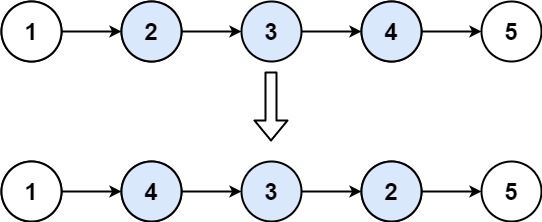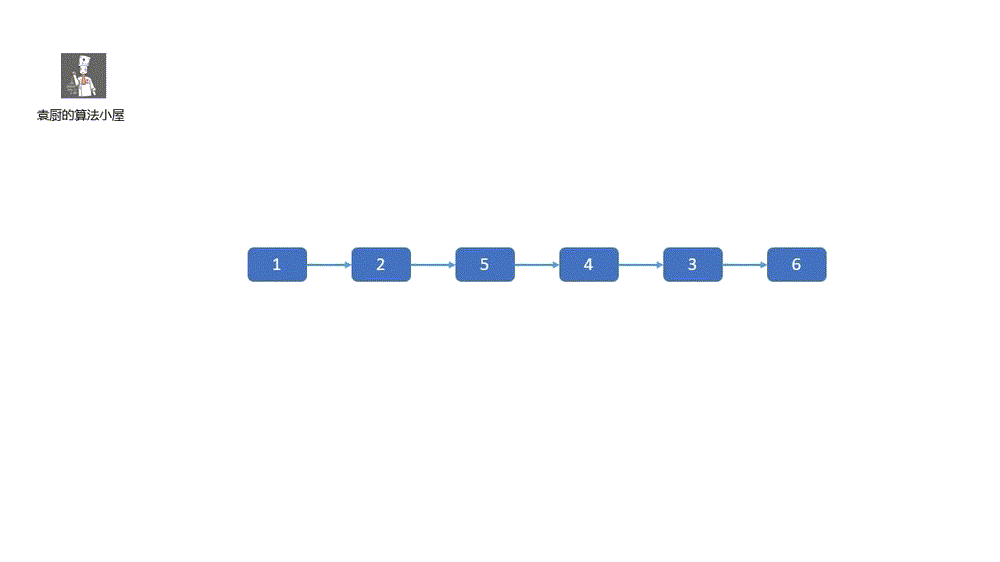mirror of
https://github.com/chefyuan/algorithm-base.git
synced 2024-11-14 16:13:39 +00:00
8.9 KiB
8.9 KiB
如果阅读时,发现错误,或者动画不可以显示的问题可以添加我微信好友 tan45du_one ,备注 github + 题目 + 问题 向我反馈
感谢支持,该仓库会一直维护,希望对各位有一丢丢帮助。
另外希望手机阅读的同学可以来我的 公众号:袁厨的算法小屋 两个平台同步,想要和题友一起刷题,互相监督的同学,可以在我的小屋点击刷题小队进入。
今天我们来说一下反转链表 2,其实这个和 1 的思路差不多,今天先说一个比较好理解的方法,完全按照反转链表 1 的方法来解决,大家看这个题目之前要先看一下【动画模拟】leetcode 206 反转链表。
下面我们先来看一下题目。
92. 反转链表 II
给你单链表的头指针 head 和两个整数 left 和 right ,其中 left <= right 。请你反转从位置 left 到位置 right 的链表节点,返回 反转后的链表 。
示例 1:
输入:head = [1,2,3,4,5], left = 2, right = 4 输出:[1,4,3,2,5]
示例 2:
输入:head = [5], left = 1, right = 1 输出:[5]
含义就是让我们反转部分链表。也就是上面蓝色的部分,那我们怎么借助 1 的方法来解决呢?
我们主要通过两部分来解决,先截取需要翻转的部分,然后再头尾交换即可。下面我们通过一个动画来看看具体步骤。
是不是很容易理解,下面我们来看代码吧。
题目代码
Java Code:
class Solution {
public ListNode reverseBetween(ListNode head, int left, int right) {
//虚拟头节点
ListNode temp = new ListNode(-1);
temp.next = head;
ListNode pro = temp;
//来到 left 节点前的一个节点
int i = 0;
for (; i < left-1; ++i) {
pro = pro.next;
}
//保存 left 节点前的一个节点
ListNode leftNode = pro;
//来到 right 节点
for (; i < right; ++i) {
pro = pro.next;
}
//保存 right 节点后的一个节点
ListNode rightNode = pro.next;
//切断链表
pro.next = null;//切断 right 后的部分
ListNode newhead = leftNode.next;//保存 left 节点
leftNode.next = null;//切断 left 前的部分
//反转
leftNode.next = reverse(newhead);
//重新接头
newhead.next = rightNode;
return temp.next;
}
//和反转链表1代码一致
public ListNode reverse (ListNode head) {
ListNode low = null;
ListNode pro = head;
while (pro != null) {
ListNode temp = pro;
pro = pro.next;
temp.next = low;
low = temp;
}
return low;
}
}
C++ Code:
class Solution {
public:
ListNode* reverseBetween(ListNode* head, int left, int right) {
//虚拟头节点
ListNode * temp = new ListNode(-1);
temp->next = head;
ListNode * pro = temp;
//来到 left 节点前的一个节点
int i = 0;
for (; i < left-1; ++i) {
pro = pro->next;
}
//保存 left 节点前的一个节点
ListNode * leftNode = pro;
//来到 right 节点
for (; i < right; ++i) {
pro = pro->next;
}
//保存 right 节点后的一个节点
ListNode * rightNode = pro->next;
//切断链表
pro->next = nullptr;//切断 right 后的部分
ListNode * newhead = leftNode->next;//保存 left 节点
leftNode->next = nullptr;//切断 left 前的部分
//反转
leftNode->next = reverse(newhead);
//重新接头
newhead->next = rightNode;
return temp->next;
}
//和反转链表1代码一致
ListNode * reverse (ListNode * head) {
ListNode * low = nullptr;
ListNode * pro = head;
while (pro != nullptr) {
ListNode * temp = pro;
pro = pro->next;
temp->next = low;
low = temp;
}
return low;
}
};
JS Code:
var reverseBetween = function (head, left, right) {
//虚拟头节点
let temp = new ListNode(-1);
temp.next = head;
let pro = temp;
//来到 left 节点前的一个节点
let i = 0;
for (; i < left - 1; ++i) {
pro = pro.next;
}
//保存 left 节点前的一个节点
let leftNode = pro;
//来到 right 节点
for (; i < right; ++i) {
pro = pro.next;
}
//保存 right 节点后的一个节点
let rightNode = pro.next;
//切断链表
pro.next = null; //切断 right 后的部分
let newhead = leftNode.next; //保存 left 节点
leftNode.next = null; //切断 left 前的部分
//反转
leftNode.next = reverse(newhead);
//重新接头
newhead.next = rightNode;
return temp.next;
};
//和反转链表1代码一致
var reverse = function (head) {
let low = null;
let pro = head;
while (pro) {
let temp = pro;
pro = pro.next;
temp.next = low;
low = temp;
}
return low;
};
Python Code:
class Solution:
def reverseBetween(self, head: ListNode, left: int, right: int) -> ListNode:
# 虚拟头节点
temp = ListNode(-1)
temp.next = head
pro = temp
# 来到 left 节点前的一个节点
for _ in range(left - 1):
pro = pro.next
# 保存 left 节点前的第一个节点
leftNode = pro
for _ in range(right - left + 1):
pro = pro.next
# 保存 right 节点后的节点
rightNode = pro.next
# 切断链表
pro.next = None # 切断 right 后的部分
newhead = leftNode.next # 保存 left 节点
leftNode.next = None # 切断 left 前的部分
# 反转
leftNode.next = self.reverse(newhead)
# 重新接头
newhead.next = rightNode
return temp.next
# 和反转链表1代码一致
def reverse(self, head):
low = None
pro = head
while pro is not None:
temp = pro
pro = pro.next
temp.next = low
low = temp
return low
Swift Code:
class Solution {
func reverseBetween(_ head: ListNode?, _ left: Int, _ right: Int) -> ListNode? {
// 虚拟头结点
var temp = ListNode(-1)
temp.next = head
var pro:ListNode? = temp
// 来到 left 节点前的一个节点
var i = 0
for n in i..<left - 1 {
pro = pro?.next
i += 1
}
// 保存 left 节点前的一个节点
var leftNode = pro
// 来到 right 节点
for n in i..<right {
pro = pro?.next
}
// 保存 right 节点后的一个节点
var rightNode:ListNode? = pro?.next
// 切断链表
pro?.next = nil // 切断 right 后的部分
var newHead:ListNode? = leftNode?.next // 保存 left 节点
leftNode?.next = nil // 切断 left 前的部分
// 反转
leftNode?.next = reverse(newHead)
// 重新接头
newHead?.next = rightNode
return temp.next
}
// 和反转链表1代码一致
func reverse(_ head: ListNode?) -> ListNode? {
var low:ListNode?
var pro = head
while pro != nil {
var temp = pro
pro = pro?.next
temp?.next = low
low = temp
}
return low
}
}
GoCode:
func reverseBetween(head *ListNode, left int, right int) *ListNode {
root := &ListNode{
Next: head,
}
temp := root
i := 0
// left的前一个节点
for ; i < left - 1; i++ {
temp = temp.Next
}
leftNode := temp
// right的后一个节点
for ; i < right; i++ {
temp = temp.Next
}
rightNode := temp.Next
// 切断链表
temp.Next = nil
newhead := leftNode.Next
leftNode.Next = nil
// 反转后将3段链表接上。
leftNode.Next = reverse(newhead)
newhead.Next = rightNode
return root.Next
}
func reverse(head *ListNode) *ListNode {
var pre *ListNode
cur := head
for cur != nil {
temp := cur
cur = cur.Next
temp.Next = pre
pre = temp
}
return pre
}

